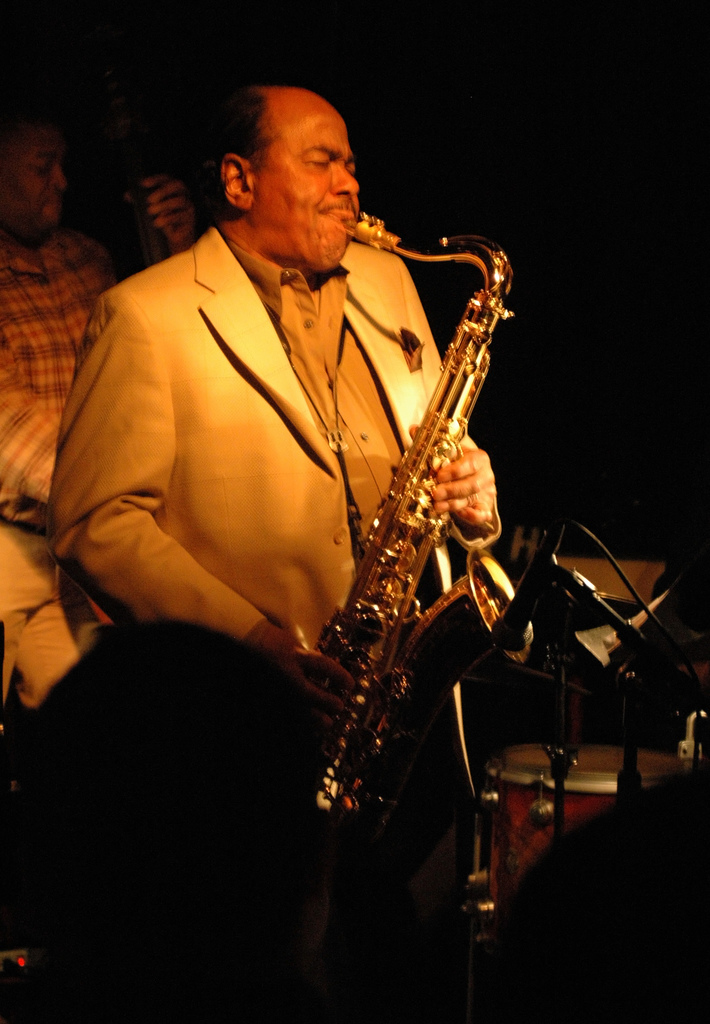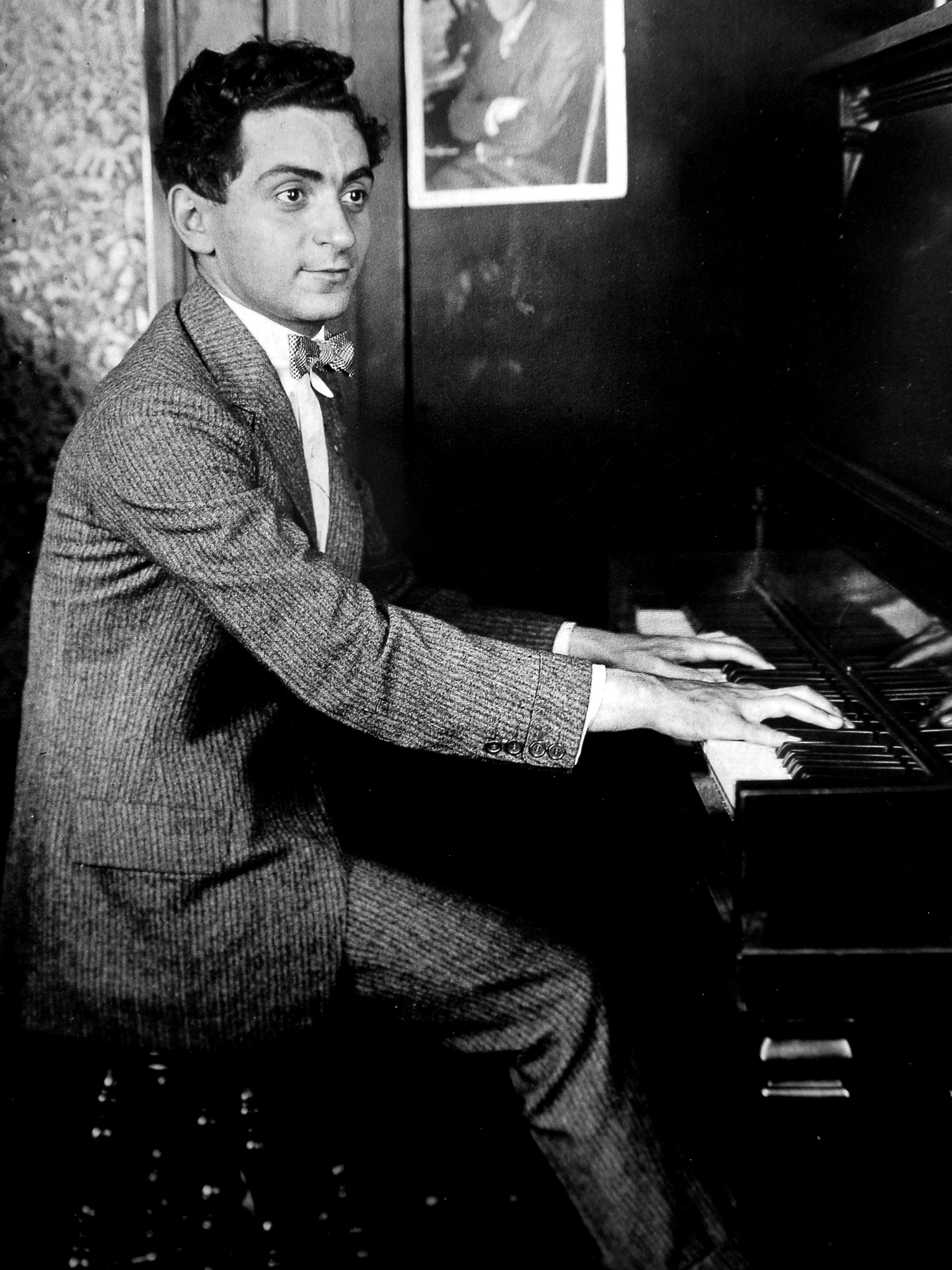|
The Return Of Bud Powell
''The Return of Bud Powell'' is a studio album by jazz pianist Bud Powell recorded in 1964 and released the same year by Roulette Records. Also on the album were bassist John Ore and drummer J. C. Moses. Author and pianist Francis Paudras highlighted disagreements between Powell and Moses prior to the session, with the pianist only agreeing to play with Moses on the condition that the volume of the drums be reduced during mixing. Reception A writer for ''Billboard'' stated that, on the album, Powell is "just as strong, polished and vibrantly exciting as before," and noted that Ore and Moses "romp along with him." Trevor Tolley of ''Coda'' wrote: "while the fingering is clean and the tone well sustained, the performances are rhythmically limp, and one has the sense at times that the bass and drums are doing their best to fit in, so as to hide the rhythmic uncertainty." Harvey Pekar, writing for ''DownBeat'', gave a mixed evaluation of the album, noting on two of the tracks that ... [...More Info...] [...Related Items...] OR: [Wikipedia] [Google] [Baidu] |
Bud Powell
Earl Rudolph "Bud" Powell (September 27, 1924 – July 31, 1966) was an American jazz pianist and composer. A pioneer in the development of bebop and its associated contributions to jazz theory,Grove Powell's application of complex phrasing to the piano influenced both his contemporaries and later pianists including Walter Davis Jr., Toshiko Akiyoshi, and Barry Harris. Born in the midst of the Harlem Renaissance to a musical family, Powell, during the 1930s, developed an attacking, right-handed approach to the piano, which marked a break from the left-handed approach of stride and ragtime that had been prevalent. Upon joining trumpeter Cootie Williams's band in 1943, he received attention from the broader musical community for his fluency and advanced technique. In 1945, he suffered a severe beating by police, followed by several years of intermittent institutionalizations. However, his recordings and live performances with Charlie Parker, Sonny Stitt, and Max Roach during ... [...More Info...] [...Related Items...] OR: [Wikipedia] [Google] [Baidu] |
Someone To Watch Over Me (song)
"Someone to Watch Over Me" is a 1926 song composed by George Gershwin with lyrics by Ira Gershwin, assisted by Howard Dietz who penned the title. It was written for the musical '' Oh, Kay!'' (1926), with the part originally sung on Broadway by English actress Gertrude Lawrence while holding a rag doll in a sentimental solo scene. The musical ran for more than 200 performances in New York and then saw equivalent acclaim in London in 1927, all with the song as its centerpiece. Lawrence released the song as a medium-tempo single which rose to number 2 on the charts in 1927. Origin Initially, "Someone to Watch Over Me" was written by George Gershwin for the musical ''Oh, Kay!'' as a "fast and jazzy" up-tempo rhythm tune – marked ''scherzando'' (playful) in the sheet music – but in the 1930s and 1940s it was recorded by singers in a slower ballad form, which became the standard. The definitive slow torch song version was first released by Lee Wiley in 1939, followed by Margaret W ... [...More Info...] [...Related Items...] OR: [Wikipedia] [Google] [Baidu] |
Lorenz Hart
Lorenz Milton Hart (May 2, 1895 – November 22, 1943) was an American lyricist and half of the Broadway songwriting team Rodgers and Hart. Some of his more famous lyrics include "Blue Moon"; " The Lady Is a Tramp"; "Manhattan"; " Bewitched, Bothered and Bewildered"; and " My Funny Valentine". Life and career Hart was born in Harlem, New York City, the elder of two sons, to Jewish immigrant parents, Max M. and Frieda (Isenberg) Hart, of German background. Through his mother, he was a great-grandnephew of the German poet Heinrich Heine. His father, a business promoter, sent Hart and his brother to private schools. (His brother, Teddy Hart, also went into theatre and became a musical comedy star. Teddy Hart's wife, Dorothy Hart, wrote a biography of Lorenz Hart.) Hart received his early education from Columbia Grammar School and entered Columbia College in 1913, before switching to Columbia University School of Journalism, where he attended for two years. [...More Info...] [...Related Items...] OR: [Wikipedia] [Google] [Baidu] |
If I Loved You
"If I Loved You" is a show tune from the 1945 Rodgers and Hammerstein musical ''Carousel''. Background In the show, the characters of Billy Bigelow and Julie Jordan sing this song as they hesitantly declare their love for one another, yet are too shy to express their true feelings. The song was in turn inspired by lines of dialogue from Ferenc Molnár's original ''Liliom'', the source material for the musical. Carousel The song was introduced by John Raitt as "Billy Bigelow" and Jan Clayton as "Julie" in the original Broadway production. The song was performed in the 1956 film version ''Carousel'' by Gordon MacRae and Shirley Jones. Other recordings There were four hit versions of the song in 1945: Perry Como (#3), Frank Sinatra (#7), Bing Crosby (#8) and Harry James (#8). In 1954, Roy Hamilton's recording went to #4 on Billboard's, Best Sellers in Stores chart. A version by Chad & Jeremy reached #16 on Canada's RPM Revolutions per minute (abbreviated rpm, RPM, rev/min ... [...More Info...] [...Related Items...] OR: [Wikipedia] [Google] [Baidu] |
Benny Golson
Benny Golson (January 25, 1929 – September 21, 2024) was an American bebop and hard bop jazz tenor saxophonist, composer, and arranger. He came to prominence with the big bands of Lionel Hampton and Dizzy Gillespie, more as a writer than a performer, before launching his solo career. Golson was known for co-founding and co-leading The Jazztet with trumpeter Art Farmer in 1959. From the late 1960s through the 1970s Golson was in demand as an arranger for film and television and thus was less active as a performer, but he and Farmer re-formed the Jazztet in 1982. Many of Golson's compositions have become jazz standards, including " I Remember Clifford", " Blues March", " Stablemates", " Whisper Not", "Along Came Betty", and "Killer Joe". He is regarded as "one of the most significant contributors" to the development of hard bop jazz, and was a recipient of a Grammy Trustees Award in 2021. Early life and education He was born Benny Golson in Philadelphia, Pennsylvania, on Ja ... [...More Info...] [...Related Items...] OR: [Wikipedia] [Google] [Baidu] |
I Remember Clifford (song)
"I Remember Clifford" is an instrumental jazz threnody written by jazz tenor saxophonist Benny Golson in memory of Clifford Brown, the influential and highly regarded jazz trumpeter who died in an auto accident at the age of 25. Brown and Golson had previously worked together in Lionel Hampton's 1953 band. The song was first recorded by Donald Byrd and Gigi Gryce in February 1957.Blumenthal, Bob (2004) In ''The Complete Argo/Mercury Art Farmer/Benny Golson/Jazztet Sessions'' D liner notes p. 3. Mosaic. Notable recordings * Bob Acri - ''Bob Acri'' (Blujazz, 2004) * Art Blakey and The Jazz Messengers – '' 1958 – Paris Olympia'' (Fontana, 1958) * Donald Byrd - ''Jazz Lab'' (Columbia, 1957) * George Cables – ''Circle'' (Contemporary, 1979) * Ray Charles – '' My Kind of Jazz'' (1970) * Kenny Dorham – '' This Is the Moment!'' (Riverside, 1958) * Don Ellis – ''Shock Treatment'' (1968) * Stan Getz and Kenny Barron – '' People Time: The Complete Recordings'' (1991) * ... [...More Info...] [...Related Items...] OR: [Wikipedia] [Google] [Baidu] |
Cole Porter
Cole Albert Porter (June 9, 1891 – October 15, 1964) was an American composer and songwriter. Many of his songs became Standard (music), standards noted for their witty, urbane lyrics, and many of his scores found success on Broadway theatre, Broadway and in Hollywood films. Born to a wealthy family in Indiana, Porter defied his grandfather's wishes for him to practice law and took up music as a profession. Classically trained, he was drawn to musical theatre. After a slow start, he began to achieve success in the 1920s, and by the 1930s he was one of the major songwriters for the Broadway musical stage. Unlike many successful Broadway composers, Porter wrote the lyrics as well as the music for his songs. After a serious horseback riding accident in 1937, Porter was left disabled and in constant pain, but he continued to work. His shows of the early 1940s did not contain the lasting hits of his best work of the 1920s and 1930s, but in 1948 he made a triumphant comeback w ... [...More Info...] [...Related Items...] OR: [Wikipedia] [Google] [Baidu] |
Just One Of Those Things (song)
"Just One of Those Things" is a popular song written by Cole Porter for the 1935 musical ''Jubilee''. Porter had written the score for ''Jubilee'' while on an extended sea cruise in the early part of 1935; however, in September 1935, ''Jubilees librettist Moss Hart mentioned that the play's second act required an additional song. Porter had "Just One of Those Things" completed by the following morning. (He had previously used the title for a song intended for but not featured in the 1930 musical ''The New Yorkers''. Apart from the title the two songs are distinct). Porter's original lyric lacked an adjective for the line "a trip to the moon on '' gossamer'' wings": "gossamer" would be suggested by his friend, Ed Tauch. A recording by Richard Himber reached the charts of the day in 1935 and Peggy Lee's stylized arrangement of the song was a No. 14 hit in the ''Billboard'' charts in 1952. Other recordings The song has become a standard of the American Songbook, with many other ... [...More Info...] [...Related Items...] OR: [Wikipedia] [Google] [Baidu] |
Ned Washington
Ned Washington (born Edward Michael Washington, August 15, 1901 – December 20, 1976) was an American lyricist born in Scranton, Pennsylvania. Life and career Washington was nominated for eleven Academy Awards from 1940 to 1962. He won the Best Original Song award twice: in 1940 for " When You Wish Upon a Star" in ''Pinocchio'' and in 1952 for " High Noon (Do Not Forsake Me, Oh My Darlin')" in ''High Noon''. Washington had his roots in vaudeville as a master of ceremonies. Having started his songwriting career with '' Earl Carroll's Vanities'' on Broadway in the late 1920s, he joined the ASCAP in 1930. In 1934, he was signed by MGM and relocated to Hollywood, eventually writing full scores for feature films. During the 1940s, he worked for a number of studios, including Paramount, Warner Brothers, Disney, and Republic. During these tenures, he collaborated with many of the great composers of the era, including Hoagy Carmichael, Victor Young, Max Steiner, and Dimitri Tio ... [...More Info...] [...Related Items...] OR: [Wikipedia] [Google] [Baidu] |
Bronisław Kaper
Bronisław Kaper (; February 5, 1902 – April 26, 1983) was a Polish film composer who scored films and musical theater in Germany, France, and the USA. The American immigration authorities misspelled his name as Bronislau Kaper. He was also variously credited as Bronislaw Kaper, Bronislaw Kapper, Benjamin Kapper, and Edward Kane. Kaper is perhaps best remembered as the composer of the jazz standards " On Green Dolphin Street" (lyrics by Ned Washington) and " Invitation" (lyrics by Paul Francis Webster) which were the respective title songs for the Metro-Goldwyn-Mayer films '' Green Dolphin Street'' (1947) and '' Invitation'' (1952). He also scored the MGM film musical '' Lili'' (1953) for which he received the Academy Award for Best Original Score. Kaper's later works include ''Mutiny on the Bounty'' (1962), '' Lord Jim'' (1965) and the TV series '' The F.B.I.'' (1965–1974). Biography Bronisław Kaper was born in Warsaw, Poland, to an Ashkenazi Jewish family, and began play ... [...More Info...] [...Related Items...] OR: [Wikipedia] [Google] [Baidu] |
On Green Dolphin Street (song)
"On Green Dolphin Street" is a 1947 jazz standard composed by Bronisław Kaper with lyrics by Ned Washington. The song was written for the film '' Green Dolphin Street,'' starring Lana Turner and Van Heflin, which was based on a 1944 novel of the same name by Elizabeth Goudge. Jazz critic Ted Gioia notes that the song appeals to jazz musicians "because of its engaging chord changes, which alternate between eight bars of floating pedal point and eight bars of rapid harmonic movement." The song was revived in 1956 by jazz pianist Ahmad Jamal on his album '' Count 'Em 88''. As Gioia notes, Jamal's "repertoire choices were often mimicked" at this time by Miles Davis, and "Jamal's performance, with its artful use of space and dynamics, anticipates Davis's later rendition, especially with its shifting rhythmic textures." Davis's sextet version from 1958, with John Coltrane, Cannonball Adderley, and Bill Evans, solidified the song's position as a jazz classic. It has gone on to becom ... [...More Info...] [...Related Items...] OR: [Wikipedia] [Google] [Baidu] |
Irving Berlin
Irving Berlin (born Israel Isidore Beilin; May 11, 1888 – September 22, 1989) was a Russian-born American composer and songwriter. His music forms a large part of the Great American Songbook. Berlin received numerous honors including an Academy Award, a Grammy Award, and a Tony Award. He also received the Presidential Medal of Freedom from President Gerald R. Ford in 1977. Broadcast journalist Walter Cronkite stated he "helped write the story of this country, capturing the best of who we are and the dreams that shape our lives".Carnegie Hall, May 27, 1988 Irving Berlin's 100th birthday celebration Born in , Berlin arrived in the United States at the age of five. His family l ... [...More Info...] [...Related Items...] OR: [Wikipedia] [Google] [Baidu] |



